Teacher Introduction
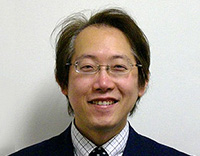
Professor Shozo Nagata
Specialized fields / Subject
Administration of Disaster Mitigation, Administration of Risk Management
Mail address: s_nagata

KANDAI SENSEI CHANNEL: https://www.sensei-ch.rd.kansai-u.ac.jp/movies/804/
https://www.sensei-ch.rd.kansai-u.ac.jp/movies/1088/
Expert’s Eyes
In dealing with various crises, administration is expected to play a very important role. What system should the administrative organization establish at the national, prefectural, municipal level, and how should they deal with natural disasters and other various social crises? To clarify them, I think the research of disaster prevention administration and crisis management administration should investigate and study.
Remarkable File
・Engaged in the research of disaster prevention administration, firefighting administration, and crisis management administration for many years. ・Conducting not only research but also social activities such as NPO etc. (Regional Atomic Energy Disaster Measures Support Association). ・Won the prize in Public Policy Studies Association JAPAN, Public Policy Forum, Student policy competition for four consecutive years from 2014. In 2017, the common theme was "Town planning for disaster prevention", and received the Kumamoto City Award. ・Wrote "Research on wide area reorganization of firefighting--Wide-area administration and firefighting administration" (Musashino University Press, 2009) and many other books. ・Also conducts research on debate education from the perspective of policy education. Collaborated in writing and editing "Introduction to policy debate" (Sokai Shuppan, 2008).
Brief Personal History
Apr. 1994: Entered the Master’s Course in Politics, Keio University Law School
Mar. 1996: Completed the above course (Master of Law)
Theme: Comparative analysis of municipal fire fighting
Apr. 1996: Teaching Associate of the Faculty of Law, Seiwa University (until Mar. 1998)
Apr. 1998: Full-time lecturer of the Department of Modern Society, Faculty of Modern Society, Musashino Women’s College (in charge of “Local Autonomy” and “Public Policy”) (until Mar. 2005)
Apr. 2008: Associate Professor of the Department of Politics and Economics, Faculty of Politics and Economics, Musashino University (the school, department and faculty have been renamed) (in charge of “Local Politics” and “Public Policy”) (until Mar. 2010)
Apr. 2011: Associate Professor of the Faculty of Societal Safety Sciences, Kansai University
Apr. 2019: Professor of the Faculty of Societal Safety Sciences, Kansai University
Behind the scenes with the research group members

The interviewee was a third-year university student,
Mr. Shohei Nakamura.
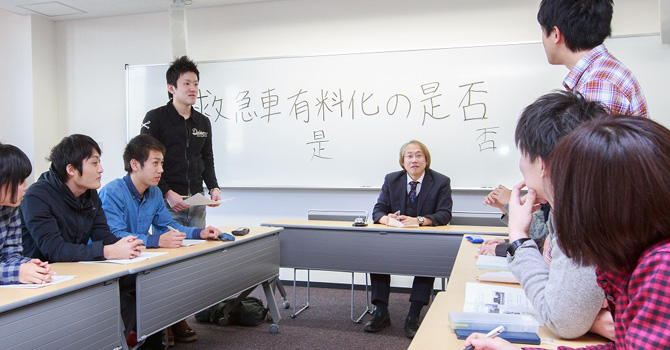
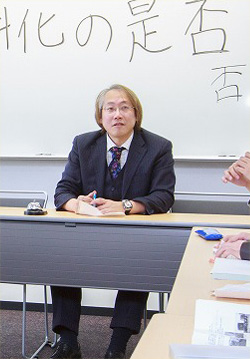
The theme of the Nagata research group is fire disaster prevention and administration. Specifically, we research about problems that fire departments and fire brigades encounter. First, we collect the basic information such as the activities of the firefighting teams, the meaning for their existence, the number of areas equipped with special troops (such as fire brigades), and the characteristics of each fire brigade. Based on such information, we also survey the number of fire brigades, the collaborative systems with the fire department headquarters, and problems that they encounter. As a result, the impact of contemporary social problems, including regional fire brigades and firefighting headquarters’ having a shortage of personnel, and regional disparities in the country's financial assistance, become clear. Nagata research group mainly conducts debate and research, based on the problems highlighted by such surveys.
Q. Mr. Nakamura, what kind of research are you yourself engaged in? Right now, we are researching current affairs from an administrative point of view. For example, to review the "regional monopolization of the electricity supply", the government is considering the separation of power generation and transmission. Over this, we are divided into 2 groups, proponents and opponents, where each group studies the problems from each point of view, takes countermeasures, and debates. In order to research this problem, using the Internet, we gathered various bits of information on other countries that have already undergone a separation of power generation and transmission. What is important here is information-collection ability. If you cannot select the appropriate information amongst various pieces of information including confusing ones, it will not be possible to have a debate. Unless you speak on a solid basis, people around you will not understand. If you repeatedly debate like that, you will acquire the ability to convince others of your thoughts.
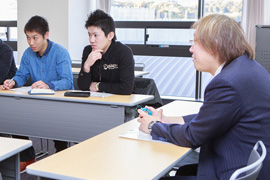
Professor Nagata is a gentle person who thinks well of his students and cares about our feelings as a top priority. He is always willing to help us and takes care of almost everything, so when we are in trouble, we rely heavily on him. When I couldn’t make a decision about my future, he gave me precise instruction that suited my personality and character, and took my problem seriously like it was his own.
On the first day of research activity, he told us, "I am going to teach you by pouring all my strength and love into it so please follow me with all your strength". There was no exaggeration in his words; not only in our studies but also in inviting us to dinner, and letting us enjoy his cooking. We feel his strength and love even in our own private time. In this way, we are very much indebted to him, so one day we would like to repay him. We will continuously do our best and will follow Professor Nagata.
Q. Tell me the atmosphere of the research group, or any interesting episodes, if any. Our group has a relatively tight atmosphere because there are many people who silently work on their own tasks and studies. When our senior members who are aiming to become civil servants are studying, the atmosphere is especially serious. Of course, it does not mean that we are always like that. We sometimes chat and have fun, and we can admit to being noisy occasionally (laugh). During summer vacation, we went to Bozejima Island located off the coast of Himeji, Hyogo Prefecture. We swam in the ocean, played baseball, and had fireworks on the beach. We enjoyed it like children, and it’s a wonderful memory. We are all friends as a result(^ O ^)
Q. Please tell me how your research group is different from others.
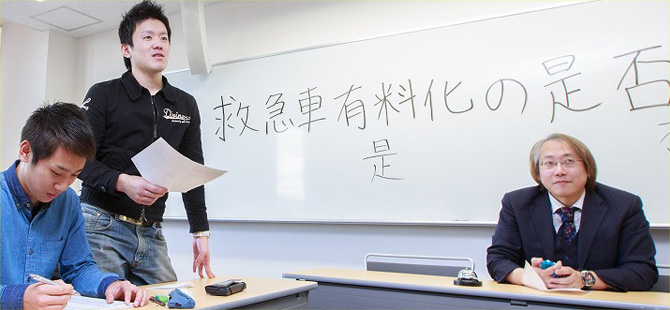 At the Nagata research group, we always start from debates. Mostly, the themes dealt with in the debates are social problems and government policies. Various themes such as: whether to participate in the TPP, whether to lift the ban on the selling of pharmaceutical products on the internet, and whether the death penalty is right or wrong, are discussed. In the flow of the debate, each side of the ‘pros’ and ‘cons’ express their opinions, ask questions and refute answers, and state the final opinion which summarizes it all. Preparation is the key to victory. Preparation is truly tough, but through that process, our abilities grow, and our relationship becomes closer. I think that those things will surely be useful in an interview at the time of job hunting.
At the Nagata research group, we always start from debates. Mostly, the themes dealt with in the debates are social problems and government policies. Various themes such as: whether to participate in the TPP, whether to lift the ban on the selling of pharmaceutical products on the internet, and whether the death penalty is right or wrong, are discussed. In the flow of the debate, each side of the ‘pros’ and ‘cons’ express their opinions, ask questions and refute answers, and state the final opinion which summarizes it all. Preparation is the key to victory. Preparation is truly tough, but through that process, our abilities grow, and our relationship becomes closer. I think that those things will surely be useful in an interview at the time of job hunting.
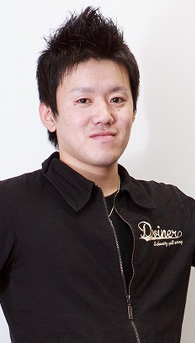
(1) Those who are concerned about job hunting activities.
Our research schedule makes it easy to secure time for studying things other than research activities (for example, public servant examinations). Professor Nagata will greatly support students who wish to be civil servants and who wish to work for general corporations.
(2) Those who are not good at speaking but have a desire to overcome it.
Even if we are not good at speaking in public, we must speak at debate competitions. Since we must fight in the same stage as people who are naturally good at speaking, your ability to speak in public will surely improve. If it is difficult to convey your ideas correctly to others, you will improve your ability to express yourself.
(3) Someone who wants a lifetime friend
Since we study for a long time to prepare for debate competitions, we spend a lot of time together. Thanks to that, the members of the Nagata research group have become very close. If a member is depressed due to failing something, we cheer him/her up, encourage and truly understand each other. As a result, we can become lifetime friends.
*This article was written in AY2013.